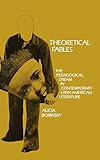Theoretical Fables : The Pedagogical Dream in Contemporary Latin American Literature / Alicia Borinsky.
Material type: TextSeries: Penn Studies in Contemporary American FictionPublisher: Philadelphia : University of Pennsylvania Press, [2015]Copyright date: ©1994Description: 1 online resource (168 p.)Content type:
TextSeries: Penn Studies in Contemporary American FictionPublisher: Philadelphia : University of Pennsylvania Press, [2015]Copyright date: ©1994Description: 1 online resource (168 p.)Content type: - 9780812232349
- 9781512800906
- 863 20
- PQ7552.N7 B67 1993eb
- online - DeGruyter
- Issued also in print.
| Item type | Current library | Call number | URL | Status | Notes | Barcode | |
|---|---|---|---|---|---|---|---|
 eBook
eBook
|
Biblioteca "Angelicum" Pont. Univ. S.Tommaso d'Aquino Nuvola online | online - DeGruyter (Browse shelf(Opens below)) | Online access | Not for loan (Accesso limitato) | Accesso per gli utenti autorizzati / Access for authorized users | (dgr)9781512800906 |
Frontmatter -- Contents -- Preface -- Chapter 1. An Apprenticeship in Reading -- Chapter 2. Taming the Reader -- Chapter 3. Intelligence and Its Neighbors -- Chapter 4. Literature as Risk -- Chapter 5. A Poetics of Misencounters -- Chapter 6. Is There Style Without Gender? -- Chapter 7. The Lucidity of Inaction -- Chapter 8. Closing the Book-Dogspeech -- Chapter 9. Overstaying My Welcome: Conclusions -- Bibliography -- Index -- Backmatter
restricted access online access with authorization star
http://purl.org/coar/access_right/c_16ec
Alicia Borinsky argues that the contemporary Latin American novel does not just ingeniously dismantle the referential claims of the more traditional novel; it offers a postmodern version of the lessons taught by fiction.Latin American fiction, perhaps the most inventive literature of recent decades, seems marked by its self-reflexivity, by its playful relationship to history and the everyday, and by its concerns with the ways in which language works. But is it, Borinsky asks, really a literature whose primary goal is to raise metafictional questions about writing and reading? While the effects of this literature include dismantling the illusions of realism, naturalism, and historicism, the haunting and disturbing energy of its major works lies in their capacity of invoke a region beyond literature through literature.Theoretical Fables progresses by way of close readings of the works of eight canonical-and not quite canonical-Latin American Authors. Borinsky argues that the Latin American "theoretical fable" has its origins in the work of the early twentieth-century Argentinean writer Macedonio Fernández. In this light she studies the works of Jorge Luis Borges, Gabriel Garcia Márquez, Julio Cortázar, José Donoso, Adolfo Bioy Cesares, Manuel Puig, and Maria Luisa Bombal.
Issued also in print.
Mode of access: Internet via World Wide Web.
In English.
Description based on online resource; title from PDF title page (publisher's Web site, viewed 23. Jul 2020)


